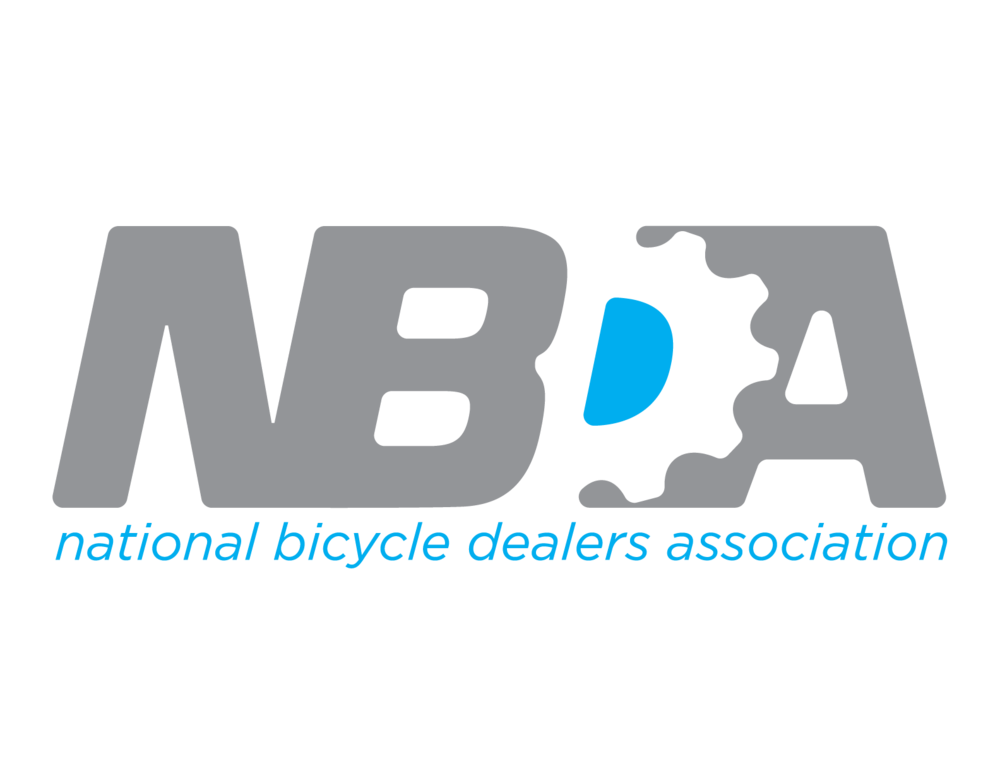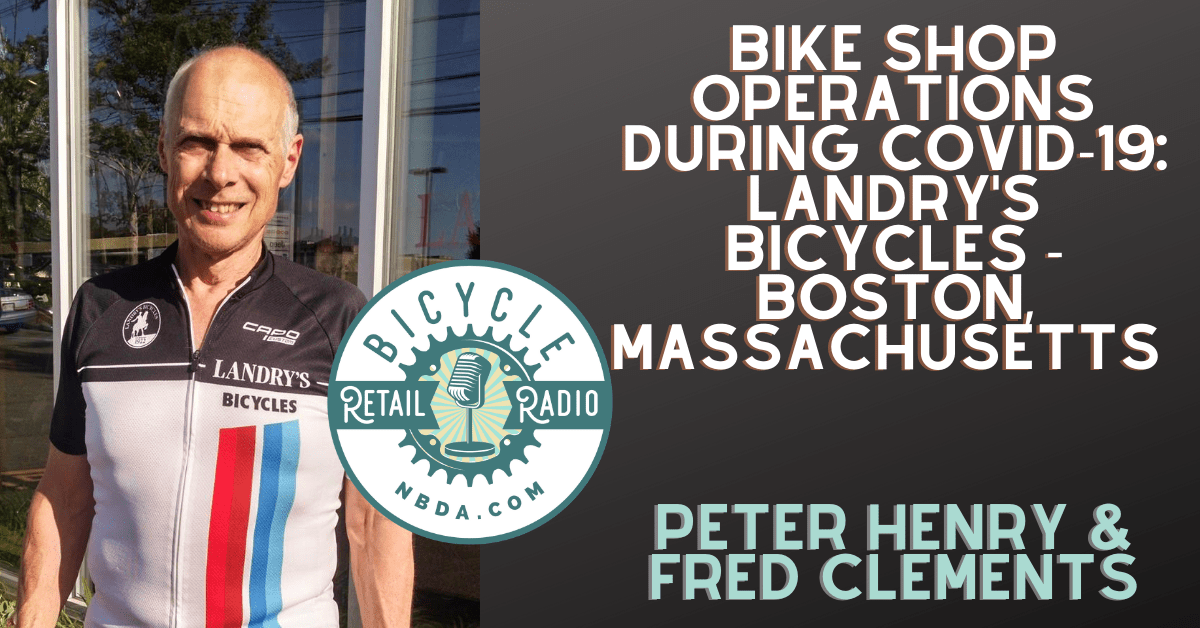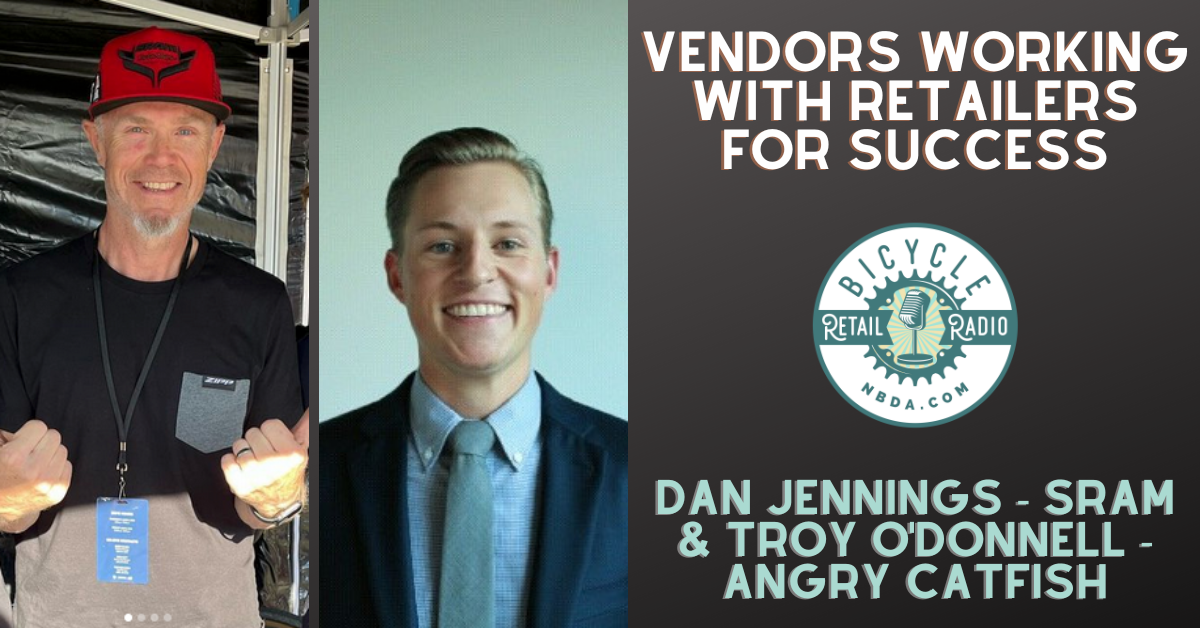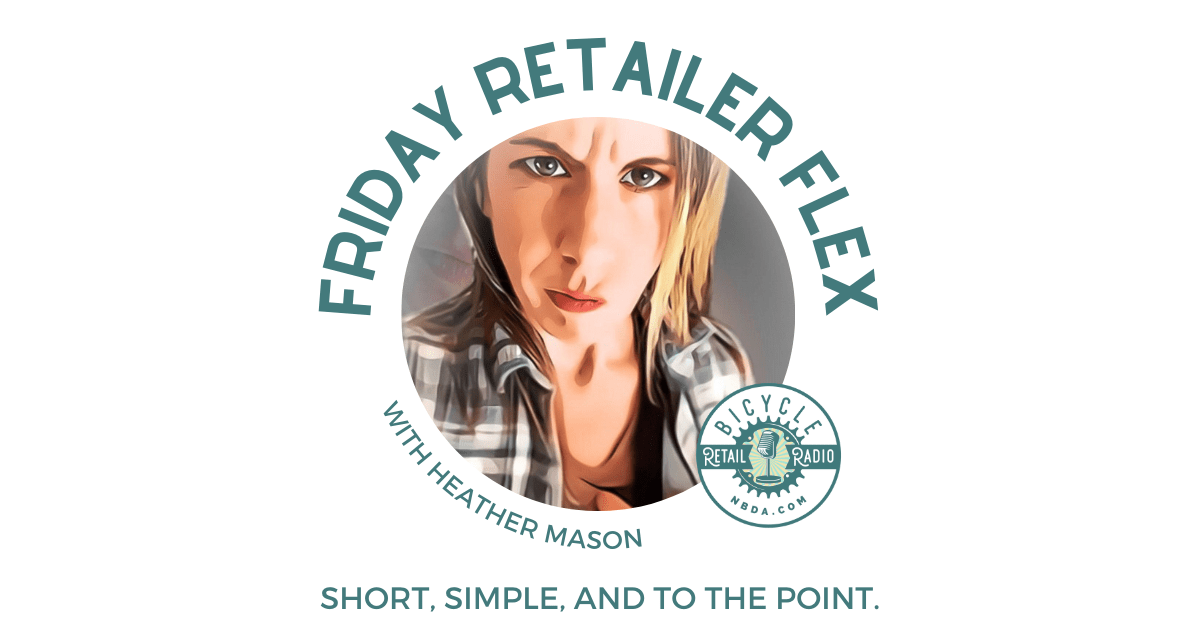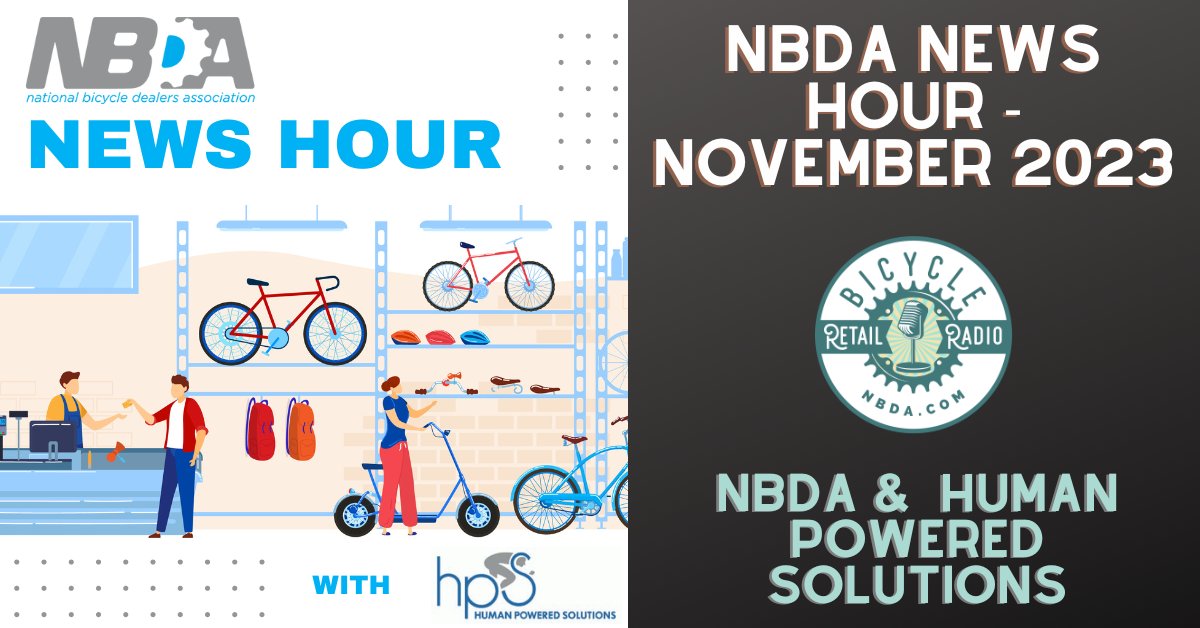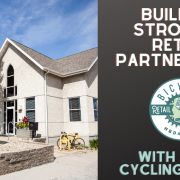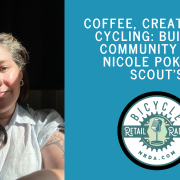Bike Shop Operations During COVID-19: Landry’s Bicycles – Boston
Bike Shop Operations During COVID-19: Landry’s Bicycles – Boston, Massachusetts: Now is an uncertain time for retail. The COVID-19 pandemic is forcing retailers to make difficult decisions like whether to close their store or not, whether or not to lay off employees, whether to ask for rent deferral or not, etc. We think that now it is more important than ever to come together and share ideas and practices between retailers all over the nation. For the second episode in this series, Fred Clements interviews Peter Henry, owner of Landry’s Bicycles in Boston, Massachusetts, and NBDA Board Member about what he is experiencing in Massachusetts at this time and what procedures he has put in place for his business. Peter shares his concerns with being so close to the “hot spot” in New York as well as how he communicates procedures to keep all 7 Landry’s stores informed and safe.
Please enjoy listening to Bike Shop Operations During COVID-19: Landry’s Bicycles – Boston, Massachusetts.
Support the show (https://nbda.com/articles/donation-form-pg511.htm#!form/Donate)
About Landry’s
Founded in 1922, Landry’s Bicycles is now rated as one of “America’s Best Bike Shops” with a growing family of bicycle stores located in Boston, Braintree, Natick, Newton, Norwood, Westboro, and Worcester, Massachusetts. Landry’s Bicycles has also been nationally recognized as National Bicycle Dealer of the Year for supporting bicycle advocacy.
Landry’s Bicycles is collectively owned by our dedicated employees. Starting in 2010, Landry’s ownership transitioned to an ESOP (employee stock ownership plan), and all core staff now own shares in the company as part of their long-term retirement benefits. As co-owners, Landry’s staff have a vested interest in collaborative teamwork, exceptional customer service, and our visionary goal for Landry’s to become “the best bike shop for the world.”
Fred & Peter Henry
Tue, 8/18 10:43AM • 40:47
SUMMARY KEYWORDS
people, bike shops, bike, customers, store, bicycle, stay, put, business, Landry, point, essential, service, landlords, home, step, sounds, employees, website, update
SPEAKERS
Fred Clements, Rod Judd, Peter Henry, Chad Pickard
Rod Judd 00:10
You are listening to the Bicycle Retail Radio brought to you by the National Bicycle Dealers Association.
Fred Clements 00:16
Welcome to the NBDA’s Bicycle Retail Radio Podcast. I’m Fred Clements and I’ll be hosting today and we’re here with Peter Henry, who is one of the owners of Landry’s bike shops in the Boston area. Hi, Peter.
Peter Henry 00:31
Hi, Fred.
Fred Clements 00:32
Yeah, so a little bit about Landry’s for those that don’t know, seven locations and in the greater Boston area, probably to be employee-owned, but now not quite there, I guess. And being in business according to the website since 1922, even though that sounds like a long time. And I guess it is. Yeah, so the topic today is one that is troubling to us all. Of course, it’s the Coronavirus. I want to make sure that we clear clarify that Today is March 25 2020, things seem to be really fluid moving very quickly. And we’d hate to put out bad information. So, you know, listen to this, if you will, with the understanding that it’s a specific point in time. We have, it’s impacting us all at this point, including businesses that are being forced to close. Some are allowed to stay open. Consumers in some states locked down in some states allowed to go out on a limited basis, and some without controls at all, I think. And so businesses, of course, are being affected and people’s employment is affected. Our focus today is a narrow one on bike shops, some of which are closed, some of which are open, and of those open, and some are taking a whole different approach than the norm or running the business and protecting staff and consumers. Some bike shops in some states are allowed as essential businesses Given the service and repair needs of the transportation community out there using bicycles, some not. And so the whole point here is to talk to Peter about what a fairly large independent bike shop group has done to, at this point anyway, remain open under certain conditions for the public and serving that public. And so I wanted to ask first, Peter, what is the current situation in Massachusetts in the Boston area? What are your parameters of what you’re dealing with in terms of regulations and like,
Peter Henry 02:35
well, the governor ordered a lockdown as of noon yesterday, and we had decided that we’re going to be closed yesterday anyway, just because our staff has been working so hard with the added stress of worrying about their own safety and in dealing with the public despite very careful processes we put in place the bike shops are not on the list of specifically Essential businesses. But neither did they say that bike shops are not on the list. And transportation needs were vaguely considered essential. And but we know that we have a lot of customers who do depend on their bikes to get to work. And so we declared ourselves to be essential, we applied the state to be considered essential. And we have been reaching out to our local town and city governments to because, in Massachusetts, they’re leaving enforcement to the local governments. And so we’ve been reaching out to our local governments to get them to agree that we are essential. And two of them have officially done so already. And that is great to help our cause. Just as one example, yesterday evening, we happen to have an employee at one of the stores and a customer knocked on the door. And he was on his way to work and had a flat tire so we took care of it for him, and turns out that he actually is an international news reporter getting to his job to report on international news, with is clearly a highly essential thing for the public these days. And he was a very nice letter of appreciation, and that that’s the kind of thing that really persuades Governor’s Oh, yes. We don’t know how they’re going to be essential. But yeah, it’s good. They’re there for people.
Fred Clements 04:16
So, you know, we’re at towards the end of March now and Spring has sprung. And I think the first evidence of this was, is not that long ago, only a couple of weeks. How did this get on Landry’s radar? And what were your first thoughts and first steps in terms of putting your current plan in place?
Peter Henry 04:35
Well, we have a couple of people within our company that is connected to the medical community. And in our city, some of the leading epidemiologists in the country in the world are located here in Boston. So we were seeing things like that whatever number is being reported, it’s probably about 100 times that bad and look at how it’s exploded, how rapidly it’s exploded elsewhere. So we began to implement social distancing in our stores about two and a half weeks ago, but we’ve Had to update our procedures almost daily because the things that seemed good enough or not good enough. So it was, you know, we very quickly started trying to get some supplies and you know wipes and hand sanitizer, and we started saying try to stay three feet away from customers. And before we decided, well, sex teach really where we need to be going. And with customers in the store that wasn’t possible. We started restricting customers to, you know, no more customers in the store, then there was sales staff to work with them. And that quickly got overrun. And we moved on to this caution tape to mark off a 10-foot square space inside the door and one customer at a time could come in there. And we would take care of them standing six feet back from the caution tape, no showing what they’re considering and getting them what they wanted. And yes, so just daily, daily increases. And I will say for any of those any of you shops that are in areas where Oh, it hasn’t hit us that badly, yet. Has this virus is everywhere. And the reason doesn’t look bad yet is because there’s not enough testing going on. And if you wait until people are starting to die, and wait until the hospital, hospital beds start filling up to respond, you’re gonna end up as another New York and you definitely don’t want to be there. So you want to start taking this very seriously right away. And as a minimum, you know, establish all the procedures, including, at least to the point of limiting the people inside the store at a time. You need to be in front of it. And you know, if your estate’s not there yet, be a leader in your community and advocating for social distancing. And your public, you might get some pushback at first, you probably will appreciate it in time.
Fred Clements 06:44
Great. So it some of your procedures and processes here on your website. Maybe with your permission, I’ll just review them briefly and then someone can chime in and sort of fill in the gaps. So the first step you call self-service, shopping How to do it is to go to Landry’s calm or call for help for self-service shopping and you allow them to pick up in-store or shipped to the home. So you are open for business in terms of sales, and then need additional help you say, you know, call to be placed in a one on one queue, I noticed that when you go to the website, a little chat box pops up and a staffer is there available to you in real-time chat with customers. And then the plan reads will call you when your sales slot is available. So that’s the Self Service shopping module. Anything to clarify there?
Peter Henry 07:37
Right. That’s because we have a number of our sales staff are working from home. And so we get emails to them and they’re able, I use that system to you know, so that if we have more than one person doing that they can take two people in turn. He can also do that with a Google Sheet just you know, get people added onto there and then they move to take care of them by having us call the customer If we can have people do it from home with their own cell phone, which is mostly unlimited minutes, and it’d be pretty challenging try to get our phone system extended out to reach, you know, could be on our on the Landry’s phone system from their homes. And we only just added the chat system. And in the last several days, we had just one person covering the chat and he had up to six chat windows going at a time. Wow. We have not that that is seven stores. But today, I believe we’re at two people covering the chat and I have not heard how volume is going. given by the way sales are going up looks like the public, by and large, agrees that we’re an essential business.
Fred Clements 08:42
Yeah, yeah. So that the second module here is for service and repair. So you’ve come up with what looks like a pretty innovative way to do it. Step one is to place your bike at the service parking area at the store entrance. Step two is to fill out a service form at the store. Three is tagged your body With your name in for you will be contacted by the store with an estimate within 24 hours. And then five customers contacted when the bike is ready for pickup. So really no face to face sounds like anyway, no face to a face service writer to the customer in-person contact, anything to add on the service check-in process.
Peter Henry 09:22
That’s right. And you know these types of situations sometimes have you end up learning things. And you know, it could be just that people are bringing in bikes haven’t looked at for a long time and they don’t know what condition they’re in. And so they err on the side of getting too much sort of like people to grab too much toilet paper when they can get our average ticket with people just writing down what they want and leaving it before they talk to us has been bigger than it was with our sales staff. And according to track, our average ticket was already pretty big. So it does sound like we’re learning that we have been under-serving the public and our willingness to provide service for them. Know that that’s an important takeaway into the future. It is working well. And we’re really getting overrun in a way that we’ve never had before with service work. And yet part of it is that people are saying, Oh, I better get my bike going. And they’re bringing in the bike the sat in the garage for eight years.
Fred Clements 10:17
And Okay. All right. So then once you’ve completed the repair or service, there’s the pickup process, that’s a three-step process. And so you’ll be notified when the bike is ready. The customer is asked to call the store when you arrive and remain in your car. And then second is let us know your name and type of vehicle. And then step three is store personnel will retrieve the order and deliver it to you in your way while you remain in the car. I guess.
Peter Henry 10:48
Yeah, that’s a change for today. So I haven’t heard how that’s going. The customers had been able to come to the door, we’d they step into that marked off zone, we’d roll the bike over to them, then they over to that zone and they go Come over and take the bike and leave. And we were supposed to minimize the contact. And I mean that the goal is to have, you know, zero cases of contagion take place in any of our stores. And you just really have to assume because people are contagious without symptoms, you just have to assume that everybody has the infection, the only safe way to approach it, right, right. But the idea is that if they stay in their cars, and that vides, even less opportunity for the spread of infection, and we’ll, you know, if it’s a vehicle, it can fit in the trunk or put in the trunk or whatever, we may expect that we’ll be selling people, some like strap on by carriers for their, for their cars, and we’ll go out and install that for them and put the bike on that and take home. There are in a whole variety of overrated situations, but the goal is to minimize the need for anybody to ever get within six feet of anybody.
Fred Clements 11:58
That’s great. So it’s Most of what you’ve experienced in terms of uptick or action in service and repair, or are you still doing a significant amount of sales?
Peter Henry 12:10
Oh, no, we’re doing a huge amount of sales. And I don’t know if it’s people thinking that, oh, I better get it now. Well, there’s a chance, but I think that it’s more people who hadn’t thought about riding a bike in the past. Now they’re suddenly realizing that having a bike is going to be a great thing. A lot of competing activities have been shut down. I mean, you can go to the bar and buy a lot of $6 beers, which can be you can spend the price of a bike every month that way, and that’s not going to be happening. So can’t go to the movies. You just can’t go to a concert so many things you spend money on you can’t do now that matter can’t take a vacation. So that of what discretionary income there is a lot more is going to go to bicycles. There are many people who you know would have taken public Transportation sometimes ridden their bike sometimes to get to work well, you don’t feel very safe taking public transportation. So they’re using the bike when they can. So there’s likely to be a whole lot more ridership and a lot more interest in bikes from people that were never interested before. So there’s a huge potential silver lining for us. And so far that seems to be what’s happening.
Fred Clements 13:24
So it isn’t there.
Peter Henry 13:26
I will say it’s a different model mix. We’re still selling a few road bikes, we’re still selling a few high-end mountain bikes that you know, the huge volume is going on in hybrid bikes, the recreational mountain bikes and kids bikes are just the numbers have been through the roof electric bikes and dropped way off for us. But today I see that we’ve sold for so far. So it’s about 1:30 here in the time, so that’s a pretty strong start today for something that we thought had died.
Fred Clements 13:57
That’s great. So I’d be I guess it goes without saying but I’ll say it anyway. Way customers arrive at a locked door. Is that correct?
Peter Henry 14:04
They do. We’re trying to get them to have already made a tentative selection before they get there. So that we know what they’re after, we’ll have, you know the accessories that they might need ready to line up to show them. When they arrive, we might have already, they might have already ordered what they needed to be installed on the bike so that we can get them in and out as quickly as possible. It’s not warm enough yet that people are super comfortable waiting outside, although their car should be comfortable for the time that it’s going to take. We’re trying to get it done with a very minimum of customer direction. And customers are very appreciative that we’re making the effort to stay open. And so there’s been no pushback at all about the inconvenience, and might get a little bit in the states where people don’t yet know that they’re going to get slammed with this. But that’s only you know, three days to a week away at this point. So you really need to be getting ahead of it if you’re in one of those areas. And as you start learning how to upgrade your safety protocols, you’ll be well served by that as each day goes by and you realize that you haven’t gone far enough yet.
Fred Clements 15:07
So are there any restrictions yet other than the basic stay at home or dry? No, here in California cycling was specifically allowed and same with hiking until the trails became so crowded, that it was impossible to keep the six-foot distance, maybe a little easier on a bicycle. But then the government started to shut down state parks and regular parks and beaches and piers and because there are just so many people going stir crazy staying at home, that they are looking for anything to get out. And it just when that happens in an area of our population, things get crowded. Have you experienced any of that in the northeast?
Peter Henry 15:45
Not well, we’re, I think about four or five days behind you. I do know there’s a trailhead right near my house and I walked past it the other day. And we were planning to hike that trail. But we just kept on walking on the street and we went to a different trail, which is not as well known, I’d never seen more than about three cars at that fell had before. And there were 20. Wow. Okay, I mean that that access is about eight or 10 miles of trails, so they would not be crowded, there’s just not enough parking capacity if that trail had never, ever get crowded, that probably could becoming. But I think it’s quite likely that because cyclists can disperse over a period of the area many miles, we’re going to have a lot of miles of roadway being lightly used. So I think that by and large should be good for us suspecting that we may need to start reminding our busiest road customers that writing a paceline may not be very safe. Yeah, you should probably leave at least 12 feet behind the writer ahead of you. And maybe more than that, I mean, nobody knows. But you know, a lot of turbulence could keep any suspended particles up in the air for a while. And you don’t want to encounter that.
Fred Clements 16:57
No, and then given some of the groups I’ve written with there’s no shortage of liquid being expelled during certain times of the ride. That’s got to be especially concerning.
Peter Henry 17:07
Right! Yeah, definitely need to put a stop to that, you know until this thing is over, which is, you know, could easily be a year or more. Yeah.
Fred Clements 17:16
And you mentioned that you hadn’t heard any negative feedback. I know hear. There was a bar that stayed open on St. Patrick’s Day and got just hammered on social media, you know, how dare you threaten the lives and all of that you’ve had no negative yet. It sounds like
Peter Henry 17:31
very, very little. And that’s probably because you’ve been trying to stay ahead of it. We’ve had pretty frequent updates on our website. I’ve been arguing not quite enough, and we haven’t been rapid enough to modulate the tone. And right now I’m saying that we don’t want our updated information that we’re putting front and center on the homepage to sound at all like we are trying to sell prints on that. We’re trying to be here for you to meet your essential needs. And we’re trying to serve our community as best we can. Not at all sounding like we’re trying to be promotional of our store. And I’m stressing that we’re, you know, making, putting in procedures, which we realize may be inconvenient, but we feel it’s what’s needed to be done for safety. So I think that we’re kind of staying ahead of it. And I’m not personally involved with our Facebook, I don’t use Facebook myself, but I understand that we’re getting similar content put on there. So that kind of a conversation going with our customers and just keep stressing the message that this is a serious thing, and we’re taking it seriously and we take safety seriously. And I think at this point, you just can’t tell that message too much. And I’m anticipating, you know, looking for example, at Korea, once they got actively clamping down the infection rate and the rate of new infections did drop off quite dramatically. And life does return to a little bit less abnormal, I guess might be the way to put it. And as that happens, then we might want to sound more like we’re promoting ourselves as a place to do business. But for now, it’s all about, we want to serve the public, and we want to stay safe and put in safe practices is the underlying theme for our messaging.
Chad Pickard 19:18
Bicycle, Retail Radio is supported by our NBDA members, all our member benefits can be found at NBDA.com join the NBDA today.
Fred Clements 19:32
Things are obviously changing quickly and almost daily, anything you have tried as a business failed and you thought, Oh, that’s a bad idea. And the next day you changed it up any things you’ve tried that didn’t work.
Peter Henry 19:44
It’s mainly that letting customers into the stores and trying to maintain separation. We found it to be extremely challenging. You know, we had customers who even as we were asking him to stay six feet apart, which nonetheless, just step towards And sometimes coming within two feet, you know even with no coughing or sneezing going on, and no symptoms you know who feet just not a safe distance? three feet is arguable probably okay if there’s no indication of sneezing or coughing or anything, but even there very briefly, and so yes, so we’ve found that we just had to set up the caution tape to hold customers one at a time in, in their section so that we could then stand six feet back from the caution tape. You know, there are plenty of things we came up with better ideas, and yes, it’s been at least daily that we’re making changes. You know, often we make changes to three times during a day.
Fred Clements 20:42
Well, so that does lead me to a sort of an operational question. I’ve often marveled at multi-store locations, being able to make the service and, and presentation uniform among all the locations given the different styles. Have managers and all? How do you organize all of this to get everyone on the same page with seven stores? I assume you have seven managers and maybe a general manager or something that could you describe how it is you go about bringing all these probably have 50 or so employees. But onto the same page.
Peter Henry 21:18
We’re having a phone call with about 20 of the leaders in the company. So some store managers and some other key staff from the stores, our marketing people are purchasing team or our internal IT people, the managers, the general manager, finance department, and I’ve probably left out some but put a pretty good chunk of the leadership of the company and we have a phone call every morning. And so we all call in it says to go to him, Go To Meeting, phone call. There’s no other plenty of other ways to do that. And so we all call in the GM typically puts together an agenda but everybody gets to speak up about what issues they’re experiencing. And we talked about how to get today’s changes to work. So that gives a lot of opportunities to keep everybody together that provides content for the people to handle the website to get the website updated with recent information attack grip for all stores. We also, by the way, expect each store manager to make the decisions that are needed within their store, just as the Navy the captain of each ship is responsible for their ship, you know, each store manager is responsible for their store. And if things aren’t going well, and they need to just shut down until they can get things reorganized to be safe. And that’s what we expect them to do. And they say, oh, gee, we should be doing this, this would be an improvement. We want them to just go right ahead and do it. And if it works out, well then they can report on that to the team the next day and we can spread that out everybody, you know, other aspects there. I mean, this is really worrisome stressful for the staff. Yeah. So it’s really important that people can, can voice their concerns. It’s really important that we maintain a good, clear, confident, and positive attitude, and really instilled a sense of purpose. You know, why are we doing this? This is important for our communities. This is no, we’re an important part of helping America and the world deal with this pandemic. And, you know, it is like a war. And you know, we’re not on the front lines, but we’re like the supply people right behind the front lines. I really admire all of our health care workers were very much in harm’s way to help fight this, we’re a little bit less so No, we’re better off. We’re safer than like supermarket workers. I mean, look at the danger there and get there showing up to work and helping people to get their food. And that’s to be admired. And we believe that we’re helping people both with their transportation and we believe that no riding bikes is going to be a very big part of what saves the mental health, of 10s of millions of Americans in the coming months. And that’s important, and people like to be important. And, it helps gives them a reason to put up with it. But you have to be understanding that some people are, you know, really good, animated and energized by being under pressure by having to change daily and hourly and coming up with solutions and sharing those solutions. And there are other people who get really worn down by it. And we have to be understanding of that. So just paying attention to the psychological health of the staff is really important and being supportive is a big part of what goes on during those meetings as well. I’ve been asked for keeping up with what’s in what’s going on medically and economically. And what was the status of it? And I’ve got a bit of an edge because my wife is a doctor who works at Beth Israel hospital, which is one of them, you know, amongst the big Boston hospitals, it’s going to be coming under intense pressure, and it’s already groaning with the lack of supplies, there is an oncologist and just today they were deciding, okay, we’re stopping all chemotherapy, the risk for a cancer patient for chemo patient of getting coronavirus is so great that the benefit of the chemotherapy does not do not outweigh that. Yeah, so so I’m hearing a lot about what’s going on in the medical world, which is really how much the potential collapse of our medical system is really where the devastating consequences of this can come from, especially now that it seems that the Congress and senate are gonna get off their butts and actually do something about it. It’s is a big relief. The real danger is that if the medical system collapses, then we’re going to start seeing a lot of people dying, and that’s going to be a that’s going to be really damaging. should that happen? Yeah, for sure. For sure.
Fred Clements 25:52
So I notice, of course, your website is the first place I went anyway to check out all this it looks like an animal as you said, you try to update it daily. as things change, are there any other forms of outreach that you’ve done to your customer base or potential customers?
Peter Henry 26:07
We did some emailing earlier. But at this point, I don’t think that we have that much specific to us that we want to clutter people’s inboxes with, you know, I know that banks need to be keeping their customers informed about know we’re closing the branches drive-thru only, and by appointment, right, they need to be getting in front of letting people know about that. I think with a retail operation, not so much. And everybody has so much information that they need to be absorbing right now that I don’t think we want to be pushing information at people. And so the website or our social media sites who make it easily available, we’re sort of having to abandon keeping the insides of the website updated. So we’re mainly just going with the update on the homepage and You know, we’ll be just referring people back to that single daily update, rather than trying to keep it consistent throughout, which would just be an impossible task with the pace of change right now.
Fred Clements 27:14
Right? Do you have a full-time marketing person handling this? Or how do you go about them?
Peter Henry 27:19
Actually, we don’t have a full time in house person. And keeping up the website is a big part of his responsibilities. And also internal communication. Yeah, so we’re working to keep make sure that you know, he’s just focusing on doing a good job with that one daily update. And don’t be distracted by trying to carry things with consistency throughout. I mean, things like keeping our store hours updated on all places that we’re supposed to be updating our hours. It’s just not happening.
Fred Clements 27:49
So you have different hours per location?
Peter Henry 27:51
They’re mostly the same. Okay, but one of the stories says out nowhere, we’re too tired. We’re gonna have to close two hours early today. Then we Just get that put into that one, one banner on the front page saying, you know, whatever it is, you know, Newton store is going to close it for today. Just make things as simple as we can for ourselves, you know, making sure that we’re striking the right tone in the messaging to mean basically that, you know, the conversation we have going on with our customers, and we need to be really respectful of what their feelings are going to be. And, you know, make really sure that we just can’t afford never sounds like you’ll want to profit here out of this thing. And, you know, at one point, we’re hearing concern about people over profits at a time when I’m saying profit, I’m worried about, can we keep the business alive? Right, he’s still gonna be here in two months. And now things aren’t going as I expected. And when right now it looks like it’s looking more like the problem is going to be I’m getting supply because demand might be up, you know, but two days from now, that’s going to be too so Wednesday. So two days ago.
Fred Clements 28:58
It’s had So that brings us to a really important question. It sounds like your sales are at least holding or doing pretty well, which may or may not last. But just in terms of finances, a lot of stores have closed. A lot of stores reduced hours, I imagined the norm is probably reduced sales. Any advice on managing the financial side of a store? You may not have that problem as I say, but you may. And any thoughts on your cash flow and Bill paying and that?
Peter Henry 29:27
yeah, I assume it’s coming. And so right after recording this, I have another call coming up some very smart people and we’re going to decide on some principles for how we manage moving forward. And you know, number one, we have to take care of our staff or people. So we’re probably going to say that no money goes out, that’s going to jeopardize having probably six weeks of payroll covered. Just sitting in the checking account. We’re going to you know, things like landlords, you know, landlords should be in decent shape and they can necessarily sustain a long period of not having rent coming in, but they should be capable of tolerating some and a landlord to manage their business. Okay? If they call their bank and say, hey, my tenants can’t pay, what can you do for me, they’ll immediately get from the banker, oh, we can do interest-only for three months. That’s not a problem. I’ll fax doc or I’ll email you the document, you can sign an email back, and we’ll have that going for you. And that kind of thing. My understanding is banks can turn around we’ll real quickly vendors, I’m assuming that all of our vendors are scrambling to lineup financing right now, assuming that there’s going to be a massive inability to pay as invoices are coming due. And so I am confident that they’re all preparing to be as supportive as they can be. That being said, we need to be, I mean, there’s going to be plenty of other people leaning on them as well and so on. Consistent with protecting our ability to pay payroll, when money is available beyond that, we should get the money that we safely can, they do need some money coming in. So when we have the opportunity to do that we should do that don’t think it’s just a chance to beat up on them and talk to them be proactive at talking to people that you owe money to, to make sure that they’re kept up to speed on what your situation is. And they’re probably not going to roll out blanket policies, but they are probably prepared to have a number of things they can do to help so you know, landlords, you should be able to get some support from and vendors, I’m sure are trying to provide as much support as they can. And that’s likely to be quite a lot. Yeah. And your bank, your bank can’t afford to lose you as a customer. So if you give them some idea of and especially as you get to the point where you have some idea of what things might actually be looking like are you going to what extent are you going to be negatively impacted? And you say Okay, so here’s what I think I’m going to need you got me through this Chances are that the banking industry is going to be very inclined to be supportive. Especially its I’m sure if it’s a local bank, because they’re really dependent on having a good economy in town, that that’s dependent on having good small businesses in town. And from what I’m hearing about the Federal Reserve, the banks won’t have problems having access to cash. So as long as you’ve been a good business over the years, they’re probably going to try to find a way to say yes, and they will probably succeed at saying yes to your request for extra financial support. And, you know, there’s been no details on it yet. But it sounds like Congress is coming through with a relief bill. I have no idea how that’s going to impact it, but it will be it is likely to be a bit of a lifeline for those of us who are in a who end up being really badly impacted nationally by this.
Fred Clements 32:51
so, your priority is the employees have you had to hours would seem to have to be cut back for some at least you know, if you’re not even running showrooms How are you managing that? Is everyone getting their normal pay or they have some reduced hours? How are you making that decision?
Peter Henry 33:08
Not so far everybody’s been getting the normal pay. No, we spend a lot of extra time cleaning everything up. And even when customers come into that quarantine zone, every time a bike comes in for service, where I’ve sanitizing it when it comes in before we handle it. There’s a lot of extra work going on because of it. We have a lot of people redeployed at home because we have some people who just because they’re concerned we had one person who we had him stay home for two weeks because he’d been traveling. Somebody has any sort of a cold, just stay home for two weeks. We don’t want to risk spreading it to other employees if you do in fact have Coronavirus and those people we’ve had, you know manning the chat function or handling phone calls. So we have a lot of work going on from diverse locations. And so so far we haven’t cut back on employment and we’ve been able to keep Coming. And we hope to be able to do that. Because you know, it’s not like our employees are living high off the hog and can easily stash big chunks of cash aside and carry them through a rainy day. Yeah. And at this point, I’m optimistic that it may not come to that for us. But you know, if it does, it sounds like everywhere is going to have greatly stepped up unemployment compensation. So that even if you do like to lay people off, they can, I mean, in Massachusetts, now you become eligible immediately instead of with a one week waiting period. And I believe that the relief folders that are in the works, is claimed to mandate at least a similar level of stepping up everywhere.
Fred Clements 34:40
So that’s great. So as this evolves in unknown ways, I guess it’s impossible to predict the future. But some of the future is probably predictable. Any thoughts from you and what you’re looking for or what some of the decision points might be in the future, any, any things you’re watching for?
Peter Henry 34:58
Well, I’m really watching for signs that what we’ve been doing with the social distancing and with the lockdowns or stay at home orders in various states watching for signs that those are being effective, and that we are getting a handle on this. So far, it appears that the thing is still growing exponentially in the US. But part of that could just be reflecting that testing is ramping up. And to the extent that is testing is ramping up. That’s really good news because that’s a huge part of how we’ll get a handle on it and get it to tamp down and get people’s attention as to where we stand and the need to keep this up. But in all likelihood, even if this lockdown succeeds in having no new cases, they’re still going to be enough virus around that we’re going to be dealing with this for many months. And we’re not going to get back to completely normal. You know, what I’m hearing is until there’s a vaccine developed, we’re not going to get back to normal. That’s probably at least a year away. Still, probably more likely 15 months from now before that’s likely to throw me vaccine is available all around. So we’re going to be dealing with this for a long time, it’s quite likely that once we’re able to get back to a sort of semi-normal or a new normal kind of situation where there’s social distancing going on continuously, but where there’s not quite the same degree of fear, and we know that we’ve got a handle on it so that the hospitals aren’t in danger of collapse, then people will be moving about more. But I think that things like, you know, movie theaters, bars, sit down restaurants or anything close to their old capacity. I mean, they might reopen them with half the tables taken out so that you have much more separation between people. I don’t know. But a lot of the things that compete for money with owning maintaining a bike are going to go away. So we will, in all likelihood, be pretty busy coming out of this and so we need to prepare for that we need to pair to become more efficient than ever and we need to work We’re going to need to adjust to make people still feel cared for and loved when they come into our stores. And you know as it is now if you’re having a bad day, what’s the best thing you can do? Go into your bike shop. And you know, even if you go into your bike shop feeling real crappy, chances are they’re gonna cheer you up. If you go in because you had something go wrong with a bike and you’re all you know, customers come in all ticked off that we must be our fault. And, you know, typically it only takes a few minutes. And if I don’t know or relax here, we can take carrier, you know, we turn their bad day in theory taken us into a good day, and they love us forever. How do we keep that going when we can’t get closer than six feet to them? fresh new challenges, but I suspect that we will find ways of dealing with that and come out ahead. So I think that once we get past the crisis aspect of this and it’s just how do we live with this? I think that does present a world of opportunity for the bicycle Calling for bike shops because, you know, it’s often been said that bicycles, one of the greatest inventions of all time, you know, it’s one of the simple devices that can save the world. And that’s what we’re doing no in this crisis that I shall never imagine we are going to be in a situation like this. And get the bicycle is emerging as one of the really important simple things that can help us to get through this situation. So So you notice things that Gee, we could be doing this differently all the time. And that will make our lives better. Let us serve our customers better and be more profitable while we do it.
Fred Clements 38:37
Yeah, so from someone in the far western part of the US to someone in the pretty far northeast of the US so I want to wish you luck, of course, and best wishes from here and who all of us are running out involved in this, you know, let’s hope for the best and prepare for a battle that we’re just at the start of what it sounds like. So thank you very much, Peter, for sharing and opening up, you’re thinking about all of this. And I’ve enjoyed talking to you any last thought or two that you’ve been itching to say that I haven’t asked.
Peter Henry 39:09
You know, as we lead our teams in our stores, we lead our, you know, we have to be leaders in our communities as well. I mean, there are certainly portions of our communities for whom where we’re sort of a center of activity. And so we need to be leaders and everything that we know is wrong. The world is just changed very dramatically. So we just need to really focus on adapting and learning from what’s going on listening. And, you know, if we made a misstep, just say, Sorry, we’re doing our best we’re going to adjust. But you also need to, you know, especially if you’re a team’s you need to stay confident and upbeat while being attentive to anybody’s safety concerns. And you know, just let them know that you care and let them know that you care. Let them know that you care. And those are all keys to keeping your whole team upbeat. That’s really important as we move through this.
Fred Clements 40:03
Great, well thank you very much for the insights you’ve given and the thoughts you’ve shared. I appreciate it. I’m sure the listeners do too. And thank you all for having me and good luck, Peter.
Peter Henry 40:15
Well, thank you, and good luck to all you out there in California. And good luck everywhere. Everybody around the country.
Fred Clements 40:21
Great. Thank you.
Rod Judd 40:22
This has been bicycle retail radio by the National Bicycle Dealers Association. For more information on membership and member benefits, join us @NBDA.com

After spending 12 years as a writer and editor, Fred Clements worked as executive director and vice president for the National Bicycle Dealers Association for 28 years. He then moved to Interbike in a retail relations role, later transitioning into consulting. He enjoys helping the NBDA with podcasts from time to time and rides about 3,500 miles each year on his road bike.
 The NBDA has been here since 1946, representing and empowering specialty bicycle dealers in the United States through education, communications, research, advocacy, member discount programs, and promotional opportunities. As shops are facing never-before-seen circumstances, these resources offer a lifeline. Together, we will weather this. We at the NBDA will not waver in our commitment to serving our members even during this challenging time—but we need your support.
The NBDA has been here since 1946, representing and empowering specialty bicycle dealers in the United States through education, communications, research, advocacy, member discount programs, and promotional opportunities. As shops are facing never-before-seen circumstances, these resources offer a lifeline. Together, we will weather this. We at the NBDA will not waver in our commitment to serving our members even during this challenging time—but we need your support.
Now is the time to become a member as we join together to make one another stronger. Whether you’re a retailer or an industry partner, your membership in the NBDA is one of the best investments you’ll make this year.
Learn more about the benefits of being a member and join now.
